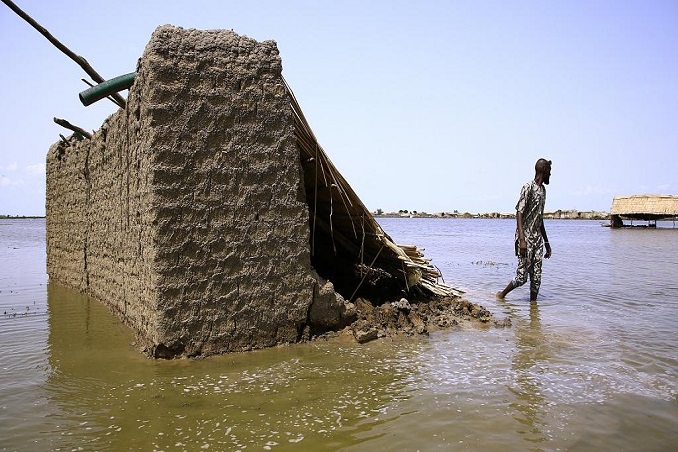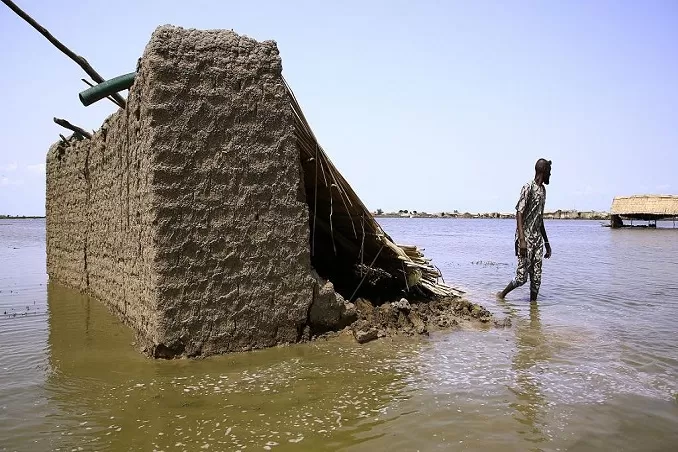

sudans floods have affected around 288000 people according to the un
Dawood Kour, a South Sudanese refugee who came to Sudan to escape a life of displacement, was forced back onto the streets after his shaky shelter was flooded. Kour crossed the border in November, fleeing years of turmoil in Malakal, a flood-prone city.
In 2011, South Sudan seceded from Sudan, becoming the world’s newest independent country. However, in late 2013, it was engulfed in a five-year civil conflict from which it is still recovering. Kour had been living in the Al-Qanaa camp in White Nile state’s Al-Jabalain region since fleeing, a burgeoning population of roughly 35,000 refugees. However, the flooding engulfed the camp this month, forcing Kour to flee once more. He made his way to the roadside’s nearest area of dry land.
According to the United Nations, torrential rains and flash floods have harmed over 288,000 people and refugees in Sudan, which has been touched by 13 of the 18 states. The crisis in neighboring South Sudan, where the deluge has affected and displaced roughly 426,000 people, has worsened humanitarian needs.
Thousands of refugees were transported to different camps in Sudan, while others sought safety in areas that were spared, although many are now homeless. Ibrahim Mohamed, a senior officer at Sudan’s refugee agency, stated, “They have become homeless.” “Finding new land for them to migrate to is proving to be a difficult task.”
Heavy rains frequently cause major flooding across the country, wreaking havoc on homes, infrastructure, and crops. Sudan issued a three-month state of emergency last year after flooding, described by the UN as the country’s worst in a century, killed 140 people and displaced 900,000 people. According to Sudanese authorities, floods have killed more than 80 people in the country so far this year, and have damaged or destroyed about 35,000 dwellings.
Sudanese residents and refugees in the Al-Jabalain area were both unprepared for the flood. “Villagers claim the floods are the worst they’ve seen in 40 years,” said Anwar Abushura, the camp’s director. To try to secure their shelters, refugees scrambled together a crude mud barricade, according to Kour. “However, the water came in so quickly that the flood barrier fell within two days,” he explained.
Many evacuees had to wade through sluggish floodwaters in order to recover building materials and personal goods from the destroyed shelters. “We don’t have food or even rugs to sleep on,” said David Bedi, a 45-year-old immigrant whose shelter had been inundated. “All we want to do is provide shelter for our children.”
Aid workers have warned that infections are about to erupt among the refugees who have been twice uprooted. Abushura, the head of the Al-Qanaa camp, claimed a “medical calamity” was expected. According to numbers published by Sudan’s refugee commission, malaria was diagnosed in around 150 refugees from Al-Qanaa and the adjoining Al-Alagaya camp, including children, on Monday.
Darquos Manuel, 32, said, “mosquitoes are eating the children, and the rain continues to pour even while we live on the streets.” “Under these conditions, there’s a slim probability of survival,” he stated. Nagwa James pointed to shelters that had buckled beneath the unrelenting torrents of water at Al-Alagaya camp, where many evacuees were relocating. “We’re afraid… we’ll be flooded like Al-Qanaa,” the South Sudanese refugee expressed his fears.
“Mosquitoes are everywhere, and there are a lot of diseases,” she said, noting that the situation was already dire. Refugees had been relocated from low-lying regions, according to Mohamed Ali Abuselib, the camp’s director. “However, most of them are out in the open,” he warned, “and we are expecting additional floods.”
South African Bank fined R700,000 after determining the institution misrepresented a credit product as an investment opportunity. Following its December…
EA Sports shows that Toronto Maple Leafs will stop their 58-year title wait by beating the Colorado Avalanche in seven…
Pope Francis, the first Latin American pope of the Roman Catholic Church, passed away in the morning of his 88th…
You want to pick a good film for weekend relaxation? Netflix South Africa provides customers with a wide range of…
The 2025 edition of AFCON will be hosted by Morocco which serves both the high-level competition and as a catalyst…
The Christian community marks Good Friday as its deepest holiday to remember when Jesus died at Calvary. The Christian community…
This website uses cookies.